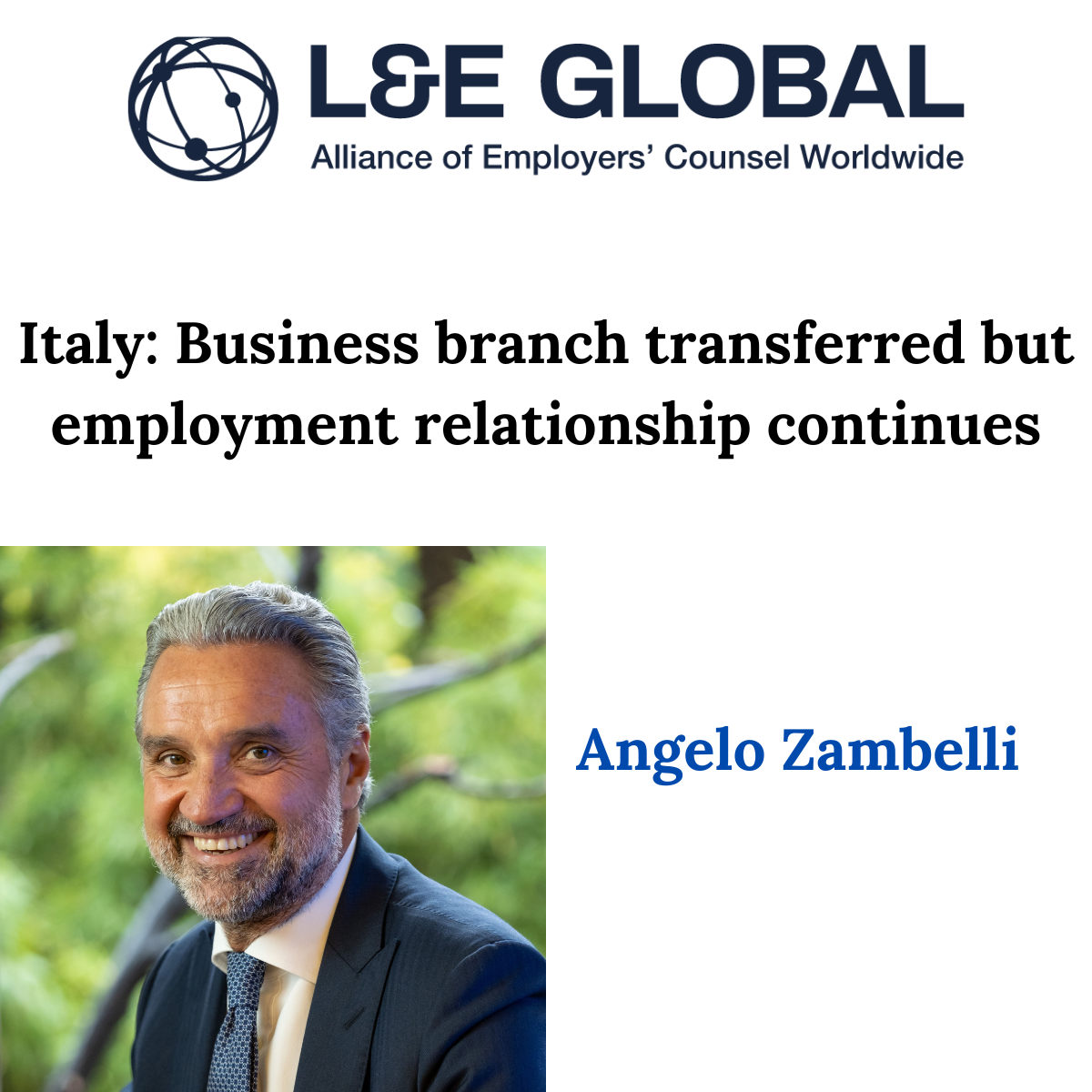Published in the L&E Global website the new article by Angelo Zambelli.
In the event of transfer of business, Article 2112 of the Civil Code applies in all cases wherein the transferor replaces itself with the transferee without interruption, including the case of transfer back of the business to the original transferor, on the condition that substantial continuation of the activity previously carried out persists.
In regulating employment relationships in the event of transfer of business, Article 2112 of the Civil Code applies in all cases in which the transferor replaces itself with the transferee without interruption, including the case of the termination of a business lease, with the consequent transfer back of the business to the original transferor, on the condition that the substantial continuation of the activity previously carried out persists.
The principle has been recently affirmed by the Supreme Court in order no. 12274 of 9 May 2025 relating to a hypothesis of double reversion. In January, the employer, manager of an ice-cream shop constituting the business unit subject to sale, informed an employee of the expiry of the lease contract entered into with the transferor, owner of the entire business, and the consequent continuation of the employment relationship with the latter company, which was again put into possession of the business. That company, contacted by the employee and also made aware that she was pregnant, replied that it had no obligation towards the employee, having closed its premises for restructuring. However, the employee’s relationship was the only one to be terminated since the other involved employees continued to work for a third company that had taken over the management of the ice cream shop, which reopened soon after – at the same location and with the same sign – between February and March of the same year.
The Court of first degree rejected the requests in the employee’s claim, considering Article 2112 of the Civil Code inapplicable to the case at hand, arguing on the absence of “business continuity.” The Court of Appeal confirmed the first-degree judgment in its entirety since it was undisputed that the third company took over the management of the ice cream shop after the termination of the employment relationship.
Contrary to the foregoing, the Supreme Court pointed out that first of all, the Court of Appeal should have assessed the existence of a “transfer phenomenon” from the transfer of the branch, i.e. at the time of the termination of the business lease. This is due to the fact that Article 2112 of the Civil Code is applicable in all hypotheses in which the transferor replaces itself with the transferee without interruption, including the leasing of a business since the obligation of the leaseholder results in an indefinite commitment to maintain the transferred employees. A commitment, which cannot be circumvented by way of the formal return of the business following the termination of the lease, even where there is, as in this case, a period of suspension of activity, since the transfer may also take place in several connected phases.
Therefore, the applicability of Article 2112 of the Civil Code could not be deemed precluded either by the non-decisive circumstance of the restructuring of the premises or by the suspension of the activity between January and February, which clearly took place for the purpose of entering into a new business leasing contract still relating to the production and sale of ice cream in the same premises and, not irrelevant circumstance, under the same sign.
Lastly, the Supreme Court also found grounded the argumentation with which the employee had pointed out that the employer’s communication pursuant to Article 2112 of the Civil Code could not be considered a dismissal, as such provision states precisely the continuation of the employment relationship without interruption.
The employee’s claim was therefore upheld, with cassation of the contested judgment and the case sent back to the court of merit for a new examination, on the basis of the above-mentioned principles.
Key Action Points for Human Resources and In-House Counsel
Practical Points
- In the event of transfer of business Article 2112 of the Civil Code applies in all cases in which the transferor replaces itself with the transferee without interruption, including the case of the termination of a business lease, with the consequent transfer back of the business to the original transferor, on condition that the substantial continuation of the activity previously carried out persists.
- In the light of the above, the obligation to keep the transferred employees cannot be circumvented by way of the formal return of the business following the termination of the lease, even where there is a period of suspension of activity, since the transfer may also take place in several connected phases.
The article is available in the L&E Global website here: https://leglobal.law/2025/06/24/italy-business-branch-transferred-but-employment-relationship-continues/



